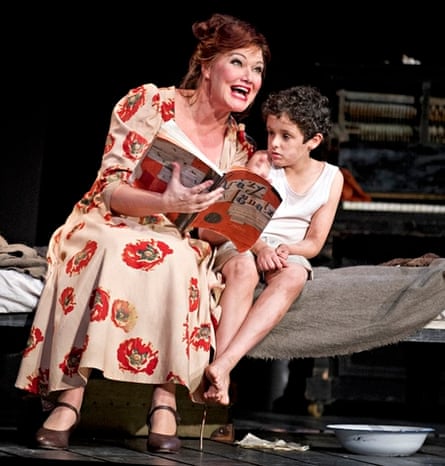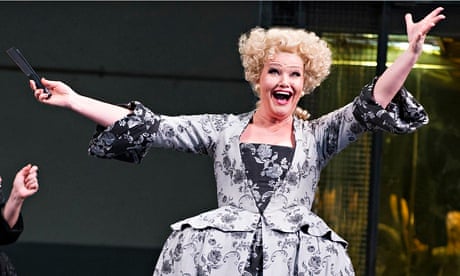It's never too late for a debut." Karita Mattila smiles. This might be becoming her mantra. She sang Marie in Berg's Wozzeck for the first time last October at the Royal Opera, and now she is back in London for her first performance as the Prima Donna in Strauss's Ariadne auf Naxos. She is 53, and need not think of her career as being in any kind of "late" stage yet; her full-bodied, radiant soprano is still as powerful, her dramatic commitment on stage as voracious as ever – and the glamour she brings to a windowless Royal Opera House meeting room just by walking into it is not in question.
Still, she has waited a long time to take on Ariadne. Why? She is characteristically direct: "When I was younger I saw Ariadne and I thought, 'Who is that boring woman sitting on that rock?'" It was Antonio Pappano, whose singer-persuading abilities are fabled, who changed her mind. "I trusted him. Now it feels like the right thing to do. I'm glad that I waited. For Ariadne it seems like you need two voices – she has light, lyrical moments and then this very deep register." For that last reason, the role has sometimes been sung by mezzo-sopranos, but Strauss wrote it for a star soprano – Maria Jeritza – and as Mattila emphasises, he knew what he was doing. "It's all about colour. If Strauss writes low notes he's searching for something – how would that sound with a soprano voice? It's been fascinating.". Moreover, it might offer a pointer to future roles. "I'm not really a Wagner expert, since I have done only Eva and Elsa, but to me Ariadne feels so Wagnerian. It's not high, but maybe the weight of it, the way it lies: it makes me wonder whether Isolde would feel like that."
Isolde? That's something to make any opera-lover sit up: will Mattila crown her career by singing Wagner's most glorious, most demanding soprano role? "I wish I had the answer! Time is passing and I find myself wondering – should I?" She has never seen Tristan und Isolde on stage. "I haven't consciously been avoiding it – but maybe subconsciously. I don't know why I have so many questions with it." Suddenly she's firm. "I should just take the score and sing it through." Then she wavers again. "The small circle of people I trust are already split in their opinions. So maybe I will keep some distance." A lot will depend on how she feels when she sings Sieglinde in Wagner's Die Walküre in Houston next spring – another role debut. "I got good advice: do Sieglinde first, see whether you like her and how you feel. I hope I will fall in love with her."
A debut as Isolde would find Mattila making headlines again in the way she likes – unlike earlier this year, when she found herself suddenly a figurehead for all those artists dismayed by Russian conductor Valery Gergiev's public support for Vladimir Putin. In April, Mattila was booked to sing Strauss's Four Last Songs with the Munich Philharmonic at Carnegie Hall in New York. The scheduled conductor was ill; Gergiev was brought in as a replacement. But Mattila decided they would have either her or Gergiev on stage, not both. The concert went ahead … under Fabio Luisi. Mattila is one of only a handful of singers with that kind of clout.

And there she would happily have left it – but it was already being reported in New York, so she spoke to a Finnish journalist to put her side of things on record, and his story ran in the Helsinki Times. Then it got nasty. Violent threats against her appeared on the Facebook page of a man who was standing as a candidate in Finland's European Parliament elections. A criminal investigation is ongoing, and she's understandably wary of talking about the threats. But of her decision regarding Gergiev, she says, "I did the right thing. I can look at myself in the mirror." Gergiev has been publicly supportive of Putin on many occasions: was it the situation in Ukraine or the gay rights issue that made her want to protest? "That all combined. You can argue whether politics belongs in our business, but I couldn't imagine being on the same stage. It was a reaction. I have no regrets."
Mattila's mood brightens as we return to opera, even though the subject might be expected to inspire mixed feelings. For years she has owned the title role of Janáček's opera Jenůfa, about a young woman who becomes pregnant, and whose foster mother, the Kostelnička, drowns the newborn, believing this will give Jenůfa a better life. At face value, the Kostelnička seems one of opera's great evil-doers; look closer, and she's a rivetingly complex character. Mattila will sing her last Jenůfa in the autumn; then, in San Francisco in 2016, she sings her first Kostelnička. She's looking forward to the change. "It's time to move on. There are wonderful new young Jenůfas" – hers will be the Swedish soprano Malin Byström – "and it's not such a sad transformation – I have always found the role of the Kostelnička intriguing, and hoped I would play her one day. It's sort of the same in Lohengrin – singing Elsa and dreaming of being able to sing Ortrud, the mean woman, the magic woman. I'd love to do her next!" It could just happen: after all, it's never too late for a debut.

Comments (…)
Sign in or create your Guardian account to join the discussion